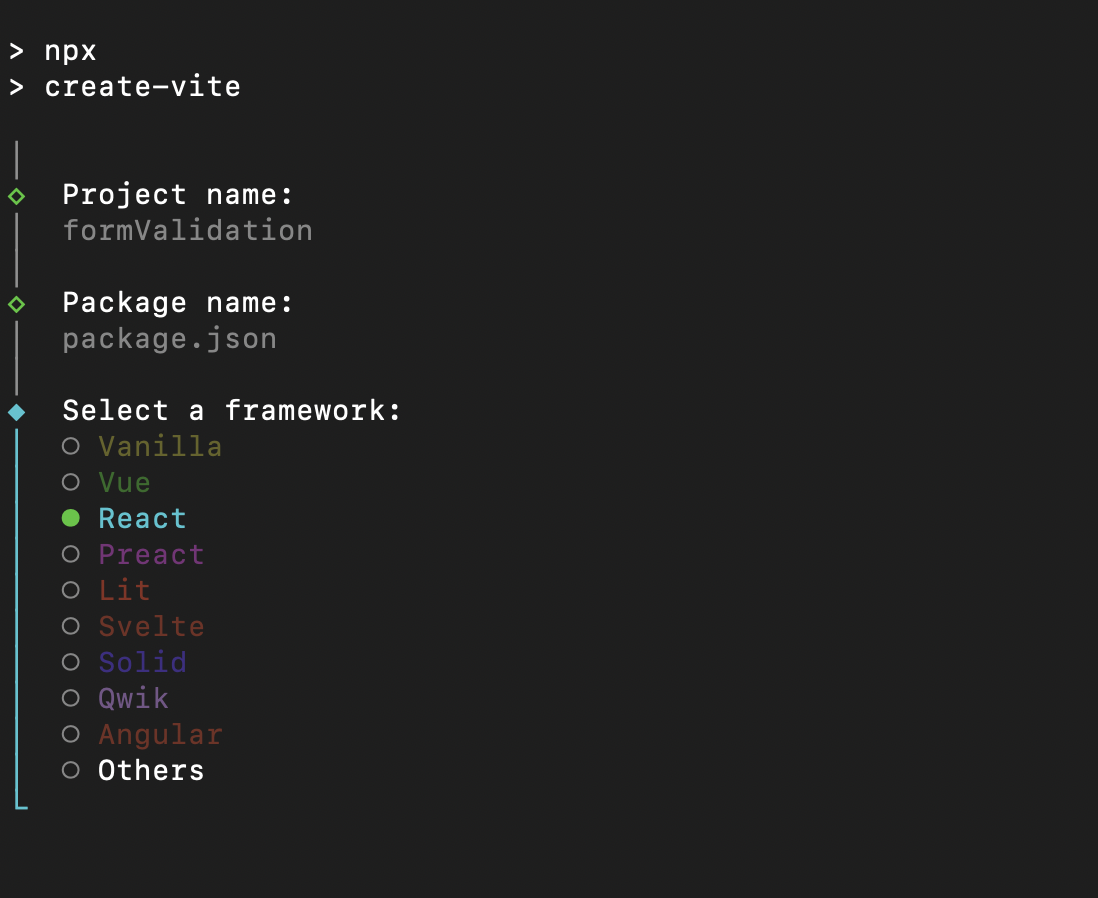When building web applications, we use forms to collect inputs from users. Every form field serves a purpose on the application. Forms makes collection of user input like: login details, sign-up information or user feedback easy to collect and analyse.
What is Form Validation?
Form validation is the process of checking if the data entered by a user is correct and complete before sending it to the server
Form validation helps to prevent users from submitting a form with invalid or missing information. For example we can check if:
- the email typed is correct
- password is long enough
- No required field is empty
In this article, I will work you through on how to do basic form validation with reactjs
Getting Started
We will build a simple signup form with three fields:
- Password
- Username
Step by Step Example
- *Basic Setup *
Firstly, we will create a react app with:
npm create vite@latest
follow the prompt as shown below



Now run the commands:
cd
npm install
npm run devreplace formValidation with your project name
Now lets create our signUp Form
//SignUpForm.jsx
import React, { useState } from 'react'
const SignUpForm = () => {
// use useState to monitor all the input values and error state
const [userName, setUserName] = useState("")
const [email, setEmail] = useState("")
const [password, setPassword] = useState("")
const [error, setError] = useState({})
// submit the form
const handleSubmit = (e) => {
e.preventDefault()
let formErrors = {}
// validateing the username field
if(!userName){
formErrors.userName = "User Name cannot be empty"
}
// validateing the email field
if(!email){
formErrors.email = "Email is required"
}else if(!/\S+@\S+\.\S+/.test(email)){
formErrors.email = "Email is Invalid"
}
// validating the password field
if(!password){
formErrors.password = "Password is required"
}else if(password.length < 8){
formErrors.password = "Password must be at least 8 characters"
}
//add the errors
setError(formErrors)
// submit if there is no error and reset the input values
if(Object.keys(formErrors).length === 0) {
alert("Form submitted successfully")
setEmail("")
setPassword("")
setUserName("")
}
}
return (
Sign Up
Username
setUserName(e.target.value)}
/>
{error.userName && {error.userName}}
Email
setEmail(e.target.value)}
/>
{error.email && {error.email}}
Password
{setPassword(e.target.value)}}
/>
{error.password && {error.password}}
Submit
)
}
export default SignUpForm//App.jsx
import './App.css'
import SignUpForm from './signUpForm'
function App() {
return (
)
}
export default AppFor the CSS
//App.css
* {
padding: 0;
margin: 0;
}
.container {
height: 100vh;
background-color: gray;
width: 100%;
display: flex;
align-items: center;
justify-content: center;
}
.form-container {
min-width: 400px;
background-color: rgb(158, 128, 186);
padding: 20px;
border-radius: 10px;
}
h2 {
font-size: 30px;
margin-bottom: 30px;
}
.form-group {
display: flex;
flex-direction: column;
gap: 5px;
margin-bottom: 30px;
position: relative;
}
.error {
position: absolute;
bottom: -18px;
left: 5px;
color: red;
}
input {
padding: 10px 20px;
background-color: gray;
border: none;
}
label {
font-size: 20px;
}
button {
width: 100%;
padding: 10px;
background: #000;
color: white;
}